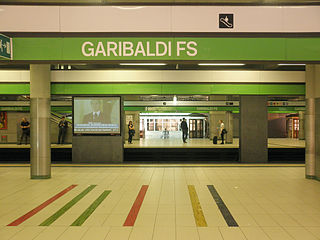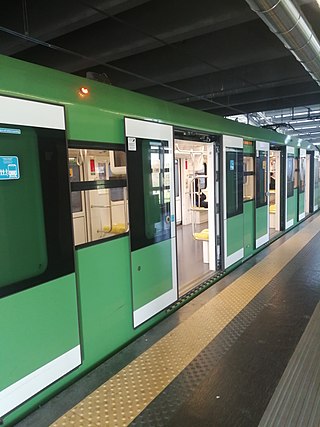
Milano Centrale is the main railway station of the city of Milan, Italy, and is the second busiest railway station in Italy for passenger flow and the largest railway station in Europe by volume.

The Milan Metro is the rapid transit system serving Milan, Italy, operated by Azienda Trasporti Milanesi. The network consists of 5 lines with a total network length of 104.1 kilometres (64.7 mi), and a total of 113 stations, mostly underground. It has a daily ridership of about 1.4 million on weekdays. The Milan Metro is the largest system in Italy in terms of length, number of stations and ridership; and the seventh longest in the European Union.

Line 2, is a subway line serving Milan, Italy, operated by ATM as part of the Milan Metro. It is also called the Green Line,, as it is visually identified by green signs.

Line 3 is a subway line serving Milan, Italy. The line is part of the Milan Metro and is operated by ATM. Construction began in 1981 in order to be ready for the 1990 Football World Cup. It is also called the Yellow Line as it is identified by yellow signage.

The Milan–Bologna high-speed railway is a railway line that links the cities of Milan and Bologna, part of the Italian high-speed rail network. It runs parallel to the historical north–south railway between Milan and Bologna, which itself follows the ancient Roman Road, the Via Aemilia. The new railway follows the Autostrada A1 closely for much of its length. The new line allows faster traffic to run separated and increase the overall railway capacity between the two cities.

The Passante Ferroviario di Milano is an underground railway which runs through Milan, Italy.

Line 5 is an underground rapid transit line in Milan, Italy, part of the Milan Metro. The line, also known as M5 or the Lilac Line, is 12.8-kilometre (8.0 mi) long and goes through the city from the north to the north-west. It opened in stages between 2013 and 2015.

Milano Porta Garibaldi is a major railway station in the Italian city of Milan, located just to the north of the neighbourhood known as Porta Garibaldi. Porta Garibaldi is the city's main station for commuter traffic with 25 million passengers annually, although it is second to Centrale station considering total passenger traffic. The station is located on Piazza Sigmund Freud.

Cadorna FN is an underground interchange station in Milan, Italy, serving Lines 1 and 2 of the Milan Metro. The Line 1 station was opened on 1 November 1964 as part of the inaugural section of the Metro, between Sesto Marelli and Lotto. The Line 2 station was opened on 3 March 1978 as the southern terminus of the extension from Garibaldi FS. It served as the southern terminus of Line 2 until the extension of the line to Porta Genova on 30 October 1983.
Vigentino is a district ("quartiere") of Milan, Italy, part of the Zone 5 administrative division, located south of the city centre. Before 1923, Vigentino was an autonomous, rural comune. By the mid 20th century, agricultural activities were dismissed, and the area was largely urbanized, with the construction of large apartment blocks.

Como San Giovanni railway station is the main station serving the city and comune of Como, in the region of Lombardy, northern Italy. Opened in 1875, it forms part of the Milan–Chiasso railway, and is also a terminus of the Como–Lecco railway, which branches off the main line a few kilometres (miles) to the south, at Albate-Camerlata.

Lodi railway station serves the city and comune of Lodi, in the region of Lombardy, northern Italy. Launched 1861, it lies along the Milan–Bologna railway.

Centrale FS is a station on Lines 2 and 3 of the Milan Metro in Milan, Italy. The Line 2 station was opened on 27 April 1970 as a one-station extension from Caiazzo. On 21 July 1971, the line was extended to Garibaldi FS. The Line 3 station was opened on 1 May 1990 as part of the inaugural section of the line between Duomo and Centrale. Initially, Duomo was connected with Centrale by shuttle service, and on 16 December 1990, with the extension of the line to Porta Romana, full-scale service started. The station remained the terminus of Line 3 until 12 May 1991, when Sondrio was opened.
Milano Lambrate railway station is one of the main stations serving the city and comune of Milan, Italy.

The Milan S Lines constitute the commuter rail system serving the metropolitan area of Milan, Italy. The system comprises 12 lines serving 124 stations, for a total length of 403 km. There are 415 trains per day with a daily ridership of about 230,000.

Milanofiori Nord is a station on Line 2 of the Milan Metro, in the southern suburb of Assago. The line here runs beside Autostrada A7. The station was opened on 20 February 2011 as part of an extension from Famagosta to Assago Milanofiori Forum.

Milanofiori Forum is a station on Line 2 of the Milan Metro, in the southern suburb of Assago. The line here runs beside Autostrada A7, and it is the southernmost station of the network. The station was opened on 20 February 2011 as the terminus of a two-station extension from Famagosta.

Piazza Abbiategrasso is a station on Line 2 of the Milan Metro. It is one of the two southern termini of the line, the other one being Assago Milanofiori Forum. The station was opened on 17 March 2005 as a one-station extension from Famagosta.

The Zone 6 of Milan, since 2016 officially Municipality 6 of Milan, is one of the 9 administrative divisions of Milan, Italy.

The S9 is a commuter rail service of the Milan suburban railway service, which converges on the city of Milan, Italy.

















